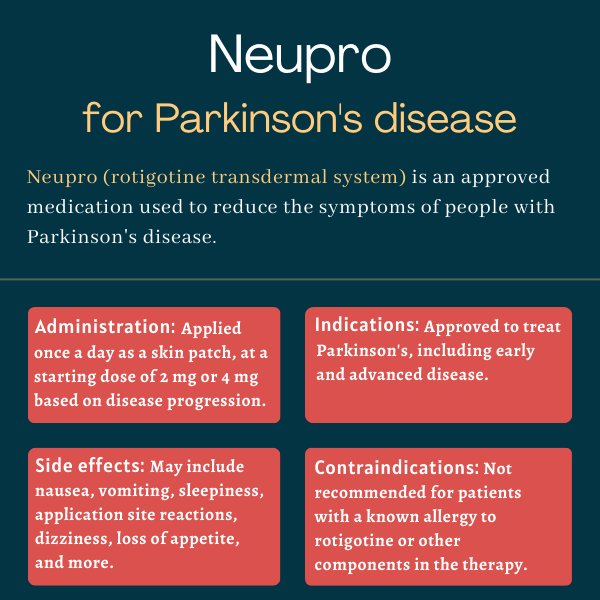Neupro (rotigotine transdermal system) for Parkinson’s disease
What is Neupro for Parkinson’s disease?
Neupro (rotigotine transdermal system) is an approved transdermal patch — an adhesive patch placed on the skin as a way to deliver medication — to treat the signs and symptoms of Parkinson’s disease.
Marketed by UCB, Neupro delivers its active ingredient through the skin, directly into the bloodstream. This method allows for consistent and uninterrupted medication release throughout the day, maintaining a stable and continuous supply of the drug.
The patches also are approved for the treatment of moderate to severe restless legs syndrome, a condition that causes discomfort and a strong urge to move the legs.
Therapy snapshot
| Brand Name: | Neupro |
| Chemical Name: | Rotigotine transdermal system |
| Usage: | Used to ease symptoms of Parkinson’s disease |
| Administration: | Skin patch |
How does Neupro work?
Parkinson’s disease is a progressive neurodegenerative disorder characterized by the death of brain cells responsible for producing dopamine, a vital neurotransmitter that facilitates communication between brain cells. The decline in dopamine levels leads to a gradual loss of motor control and the emergence of various other symptoms.
Neupro’s active ingredient is rotigotine. This is a dopamine agonist that has similar properties to dopamine and can act as a substitute for the decreasing amounts of dopamine in the brain of Parkinson’s patients.
The treatment comes in the form of sticky patches that are applied to the skin and deliver rotigotine directly into the bloodstream. Rotigotine then travels to the brain and stimulates dopamine receptors, which helps to ease motor and nonmotor symptoms in patients with Parkinson’s disease.
Who can take Neupro?
Neupro was approved by the U.S. Food and Drug Administration in 2007 to treat people with early-stage Parkinson’s, making it the first patch formulation available for the treatment of Parkinson’s disease. This indication was later extended, in 2012, to include the treatment of those with advanced disease.
The treatment gained approval in the European Union in 2006, and also is approved in Australia, Canada, China, and Japan, for use in Parkinson’s disease.
Who should not take Neupro?
Neupro is not recommended for people with a known allergy to rotigotine or any other components in the therapy, which include a sulfite called sodium metabisulfite.
The treatment also should generally not be taken by patients with a major psychotic disorder, due to a risk of psychosis exacerbation.
How is Neupro administered in Parkinson’s?
Neupro is a small, tan-colored adhesive patch that is worn continuously for 24 hours. It is available in six dosing strengths, but only four are routinely used in Parkinson’s:
- 2 mg
- 4 mg
- 6 mg
- 8 mg.
The other two doses, of 1 mg and 3 mg for 24 hours, are indicated for restless legs syndrome.
Each patch is composed of three layers: a backing film, the drug matrix, and a protective liner. The backing film is a flexible and tan-colored material whose primary function is to offer structural support and safeguard the rotigotine-loaded adhesive layer from environmental factors. The adhesive layer also is safeguarded by a transparent and protective liner, which is removed before application.
For early-stage patients, the recommended starting dose of Neupro is 2 mg daily. For those with advanced disease, the recommended starting dose is 4 mg daily. If needed, the dose can be increased by 2 mg at weekly intervals, until reaching the maximum recommended dose of 6 mg per day for early-stage disease or 8 mg per day for advanced-stage disease.
Finding the optimal dose to effectively manage symptoms may take several weeks, and the prescribed dose may be achieved using single or multiple patches. Neupro can be prescribed either as a standalone treatment or as an addition to levodopa therapy.
To discontinue Neupro, it’s recommended that patients reduce the daily dose by a maximum of 2 mg every 24 hours, preferably every other day. However, reducing the dose or discontinuing Neupro should only be done under the supervision of a healthcare professional.
Neupro should be applied once a day to clean, dry, and intact skin areas, in body regions such as the abdomen, thigh, hip, flank, shoulder, or upper arm. The patch should be pressed firmly in place for 30 seconds, ensuring good contact, especially around the edges. It is important not to place Neupro on oily, irritated, or damaged skin, or where it may be rubbed by tight clothing.
The application site for Neupro should be changed daily, rotating from the right to left sides and from upper body to lower body. Patients should avoid using the same application site more than once every 14 days, or over the course of two weeks.
Neupro should be worn continuously for 24 hours, after which it should be removed and replaced immediately with a new patch on the opposite part of the body. Patients can choose a convenient time of day or night for application but should strive to apply the patch at approximately the same time each day. If a patch is forgotten, a new one should be applied as soon as possible, but then replaced at the usual time the following day.
The patch should be applied right after opening the pouch and removing the protective liner. It should not be cut or damaged, and once applied, care should be taken not to dislodge it while showering or bathing, or during physical activity. If the edges of the patch lift, it may be secured with bandage tape. If the patch detaches, a new one can be applied to a different site immediately; again, the regular schedule should be maintained.
Patients should avoid applying creams, lotions, ointments, oils, or powders to the area where Neupro will be placed. It is recommended to shave hairy areas at least three days prior, if not sooner, to the patch’s application.
A person’s hands should be washed after handling the patch, and it is important to avoid touching the eyes or other objects with any drug residue present. Upon removing the patch, it is common to experience mild redness at the application site, similar to the redness experienced when removing an adhesive bandage. This redness is expected to diminish gradually. However, if irritation or persistent itchiness occurs, it is important that the patient informs a healthcare provider.
Neupro’s backing layer contains aluminum, so the patch should be removed before undergoing MRI scans or cardioversion — a procedure used to normalize heartbeat — so as to prevent skin burns.

Neupro in clinical trials
Neupro has been proven effective in treating the signs and symptoms of Parkinson’s disease in five placebo-controlled trials. Three focused on patients in the early stages of Parkinson’s disease who were not taking levodopa, while the remaining two trials included patients with advanced-stage Parkinson’s disease who were already receiving levodopa treatment.
Trials in early-stage Parkinson’s
One clinical trial enrolled 316 early-stage Parkinson’s patients who were given either a placebo or one of four fixed doses of Neupro (2 mg, 4 mg, 6 mg, or 8 mg/day). Over a period of four weeks, the patients’ doses were adjusted gradually, with weekly increases in the number of patches. By the end of the third week, all groups had reached their target doses of Neupro, which were then maintained for the fourth week. After that, the patients continued on the treatment for seven weeks, followed by a gradual decrease in dose during the last week.
The main goal of the trial was to evaluate the change from the beginning of the study (baseline) in the Unified Parkinson’s Disease Rating Scale (UPDRS), which assesses disease severity. Specifically, the trial measured changes in part II, activities of daily living, and part III, motor performance.
This main goal also was the same in all other trials involving early disease patients.
The results showed that the mean baseline scores for both parts were similar across all treatment groups. Significant dose-dependent improvements were observed at the three highest doses, with the 6 mg and 8 mg doses having a similar effect.
A second trial enrolled 277 early-stage Parkinson’s patients who were randomly assigned to receive either flexible doses of Neupro — at the 2 mg, 4 mg, or 6 mg/day doses — or a placebo, for up to 28 weeks, or about seven months. Patients underwent a weekly adjustment of their dose over a period of three weeks, increasing by 2 mg each week until reaching a maximum dose of 6 mg, based on effectiveness and tolerance. That dose was then continued for these patients for 24 weeks, or about six months, during the maintenance phase, followed by a gradual decrease in dose over a period of up to four days.
The individuals who were treated with Neupro showed a significant mean improvement, by 5.28 points, in UPDRS subtotal scores compared with those who received a placebo. The most significant improvement was observed in part III motor scores. Additionally, a higher percentage of patients in the Neupro group (48%) showed a positive response compared with the placebo group (19%).
The third trial, called SURE-PD, investigated the effectiveness of Neupro in 561 Parkinson’s patients with early-stage disease. These participants were randomly assigned to receive Neupro at varying doses (2 mg, 4 mg, 6 mg, or 8 mg/day), or a placebo, or an active oral comparator called ropinirole. The treatment lasted for approximately 39 weeks, or just short of 10 months.
During the trial, patients underwent weekly increases in their Neupro or placebo patches, and a dose escalation of the ropinirole or placebo capsules over a period of 13 weeks, or about three months. The goal was to reach a maximum dose of 8 mg of Neupro if it proved to be effective and well-tolerated. After the dose escalation phase, patients continued their treatment for 24 weeks during the maintenance phase, followed by a gradual decrease in dose over a period of up to 12 days.
Those treated with Neupro experienced a statistically significant improvement — by a mean of 7.2 points — in the combined UPDRS scores from baseline to the end of treatment. This was much greater than the 2.2-point improvement seen with the placebo. The proportion of responders, defined as those with a 20% or greater improvement in the combined UPDRS scores, also was significantly higher with Neupro than with the placebo (52% vs. 20%).
Studies in advanced-stage Parkinson’s
The PREFER study evaluated the effectiveness and safety of two doses of Neupro in individuals with advanced Parkinson’s disease who experienced at least 2.5 hours of off time each day despite treatment with levodopa. Off time refers to periods between doses when symptoms are not effectively managed by medication.
Participants were randomly assigned to receive either placebo patches or Neupro at doses of up to 8 mg/day or 12 mg/day for 24 weeks, while continuing on stable levodopa treatment. There was an initial period of five weeks in which patients increased their dosage from an initial daily dose of 4 mg to their assigned dose.
The trial’s main goal was to determine changes in the number of daily hours spent in the off state from the beginning of the study to the end of week 24. Compared with the placebo group, there were significant reductions in total off periods for both the Neupro 8 mg group (1.8 hours/day less) and the 12 mg group (1.2 hours/day less).
A total of about 56% of patients in the Neupro 8mg group and about 55% in the 12 mg group experienced a reduction of at least 30% in their daily off time, compared with 34.5% of those receiving a placebo. Additionally, the duration of on time without dyskinesia — uncontrolled movements that are a common side effect of levodopa use — after awakening more than doubled in both Neupro treatment groups compared with the placebo group.
Patients started experiencing the benefits of treatment as early as the first week.
The CLEOPATRA Phase 3 (NCT00244387) study enrolled patients with advanced Parkinson’s who already were receiving levodopa therapy. Each was randomly assigned to receive Neupro (up to 16 mg/day), an oral dopamine agonist called Mirapex (pramipexole dihydrochloride), or a placebo for a period of six months.
The main goals were to measure the change in total off time based on daily home diaries. The trial also assessed the proportion of patients with off time reductions of 30% or more from the beginning to the end of the study.
The results showed that patients who received Neupro had, on average, 2.5 hours less off time after six months. Compared with those on the placebo, this represented a 1.6-hour greater reduction in off time from the study’s baseline. In turn, Mirapex demonstrated a reduction of 1.9 hours in off time compared with a placebo, with Neupro being deemed noninferior to Mirapex.
Among all the patients involved in the trial, 67% of those who received Mirapex, 59.7% who received Neupro, and 35% who were given a placebo experienced a reduction of at least 30% in their daily off time. Significant benefits were experienced by patients as early as after one week of Neupro treatment.
Common side effects of Neupro
The most common adverse reactions observed with Neupro in Parkinson’s clinical trials include:
- nausea
- vomiting
- sleepiness and sleep disturbances
- application site reactions
- dizziness
- anorexia
- increased sweating
- vision problems
- swelling of the arms and legs
- dyskinesia, or uncontrolled, sudden movements.
Severe allergic reactions
Neupro contains sodium metabisulfite, which can cause severe allergic reactions in people sensitive to sulfites. Asthma increases the risk of sulfite allergies.
If symptoms such as lip or tongue swelling, chest pain, breathing difficulties, or trouble swallowing occur, Neupro should be immediately removed and patients should contact their healthcare provider.
Falling asleep during daily activities
Neupro has the potential to induce sleepiness or drowsiness, and some individuals have unintentionally fallen asleep during their daily activities while undergoing treatment. It is important healthcare providers assess patients for any potential factors that may contribute to increased sleepiness, including the usage of other medications or existing sleep disorders, and discuss the associated risks of taking Neupro.
Patients who experience pronounced daytime sleepiness or sudden episodes of falling asleep during daily activities should consider discontinuing the treatment. If they opt to continue taking the medication, they should refrain from engaging in activities such as driving that may pose a risk if they unexpectedly fall asleep.
Hallucinations, psychosis, and impulse control
Neupro can impact patients’ mental health and lead to issues related to impulse control, such as gambling or excessive spending, binge eating, and heightened sexual urges. It is important to note that individuals experiencing these urges may not perceive them as abnormal. If patients encounter these complications, dose reduction or therapy discontinuation should be considered.
Additionally, this treatment may give rise to hallucinations, where patients see or hear things that are not real. During Neupro treatment, or shortly after initiating or adjusting the dosage of Neupro, patients may experience new or exacerbated mental status and behavioral changes. These changes can potentially be severe and may encompass psychotic behavior.
In some cases, patients also may experience confusion, aggressive behavior, and agitation. It is generally not recommended to administer Neupro to patients already diagnosed with a psychotic disorder, as it has the potential to worsen psychotic symptoms.
Changes in blood pressure and heart rate
Blood pressure may increase or decrease while taking Neupro, and the treatment also can increase heart rate. High blood pressure can happen when standing or lying down and is more commonly seen in patients taking the maximum recommended dose. Patients with cardiovascular disease should be aware of the possibility of significant increases in blood pressure and heart rate while using Neupro.
Reductions in blood pressure can result in a condition called orthostatic hypotension — dizziness or lightheadedness when rising from sitting or lying down, which can lead to episodes of loss of consciousness. Patients should be carefully monitored for evidence of orthostatic hypotension, especially during dose escalation periods.
Weight gain and fluid retention
Treatment with Neupro can cause weight gain, which can be associated with fluid retention. When treating patients with concurrent conditions such as congestive heart failure or renal insufficiency, it is important they be monitored for weight gain and fluid retention.
Dyskinesia
Treatment with Neupro can cause or exacerbate dyskinesias, or uncontrolled, involuntary movements, which may indicate a person’s Parkinson’s treatment may need to be changed.
Application site reactions
The Neupro patches can cause reactions at the application site, which have led to treatment discontinuation in some cases. To minimize application site reactions, these sites should be rotated daily and patches should not be applied to the same site more than once every 14 days.
Patients should notify their physician if they experience persistent application site reactions lasting more than a few days, worsening severity, or if the skin reactions extend beyond the application site.
If there is a rash or irritation from the transdermal system, it is important to avoid direct sunlight on that area until the skin heals to prevent changes in skin color.
High fever and confusion associated with rapid dose reductions
Patients should be closely monitored during and after discontinuation of Neupro, as rapid dose reductions or discontinuation of dopaminergic therapy, including Neupro, have been associated with withdrawal symptoms. These may include high fever, apathy, stiff muscles, anxiety, depression, fatigue, insomnia, sweating, and pain.
To mitigate these risks, patients should gradually reduce the dose and be closely monitored during and after discontinuation of the therapy.
Heat application
While the effect of heat on Neupro has not been studied, heat has been known to significantly increase drug absorption with other transdermal products. Patients should avoid exposing the Neupro application site to external sources of direct heat, such as heating pads, electric blankets, heat lamps, saunas, hot tubs, heated water beds, and prolonged direct sunlight.
Tissue scarring complications
Complications associated with tissue scarring — including fluid accumulation between the membranes that cover the lungs, thickening of those membranes, scar tissue in the lungs, as well as damage to the valves of the heart — have been observed in patients taking certain dopamine agonists.
These events are believed to be associated with the structure of those agents, which is distinct from Neupro’s molecular structure. However, whether the medication could also contribute to those side effects is unknown.
Use in pregnancy and breastfeeding
No adequate studies have been conducted on the use of Neupro in pregnant or breastfeeding patients. However, animal studies indicate the medication may cause harm to a developing fetus and that Neupro can pass to breast milk. Additionally, Neupro treatment may lead to reduced lactation due to the suppression of prolactin, the hormone responsible for breast milk production.
Patients who are or plan to become pregnant, and those who are nursing or plan to breastfeed, should discuss this issue with their healthcare providers.
Parkinson’s News Today is strictly a news and information website about the disease. It does not provide medical advice, diagnosis or treatment. This content is not intended to be a substitute for professional medical advice, diagnosis, or treatment. Always seek the advice of your physician or another qualified health provider with any questions you may have regarding a medical condition. Never disregard professional medical advice or delay in seeking it because of something you have read on this website.
Recent Posts
- Immune T cell response may detect Parkinson’s before symptom onset
- Bezisterim clinical trial uses hybrid design to promote accessibility
- Parkinson’s advocacy groups call for ‘robustly funded, collaborative NIH’
- I may be overprotective, but it’s progress, not perfection
- Living with Parkinson’s reminds me what friends are for
FAQs about Neupro
The U.S. Food and Drug Administration approved Neupro in July 2007 to treat people with early-stage Parkinson’s disease. This indication was later extended, in April 2012, to include treatment of those with advanced disease. Neupro was the first patch formulation available for the treatment of Parkinson’s disease in the U.S.
Animal studies suggest Neupro may be harmful to a developing fetus, but its effects on pregnant patients remain unknown due to a lack of clinical data. Consequently, the safety of Neupro during pregnancy is uncertain. Patients are advised to consult their healthcare provider if they intend to become pregnant while using Neupro.
Patients taking Neupro may experience extreme drowsiness or sudden episodes of falling asleep during daily activities. It is important for those starting the treatment to avoid driving or engaging in potentially dangerous activities until they understand how the medication affects them. If patients experience increased sleepiness or fall asleep without warning they are advised to contact their healthcare team.
Finding the right dose that effectively manages symptoms may take a few weeks, as dosages need to be adjusted for each individual patient. However, in the trials that supported Neupro’s approval, improvements in patients with advanced Parkinson’s disease were evident as early as the first week of treatment. Patients should speak with their healthcare team to understand how the medication could help in their particular case.
Treatment with Neupro has been associated with weight gain, which can be due to fluid retention and also can be associated with binge eating. While Neupro treatment has not been directly associated with hair loss, this side effect has been observed upon using certain dopamine agonists. Patients should talk with their healthcare team if they experience any unanticipated effects of treatment.
Related Articles

 Fact-checked by
Fact-checked by 







